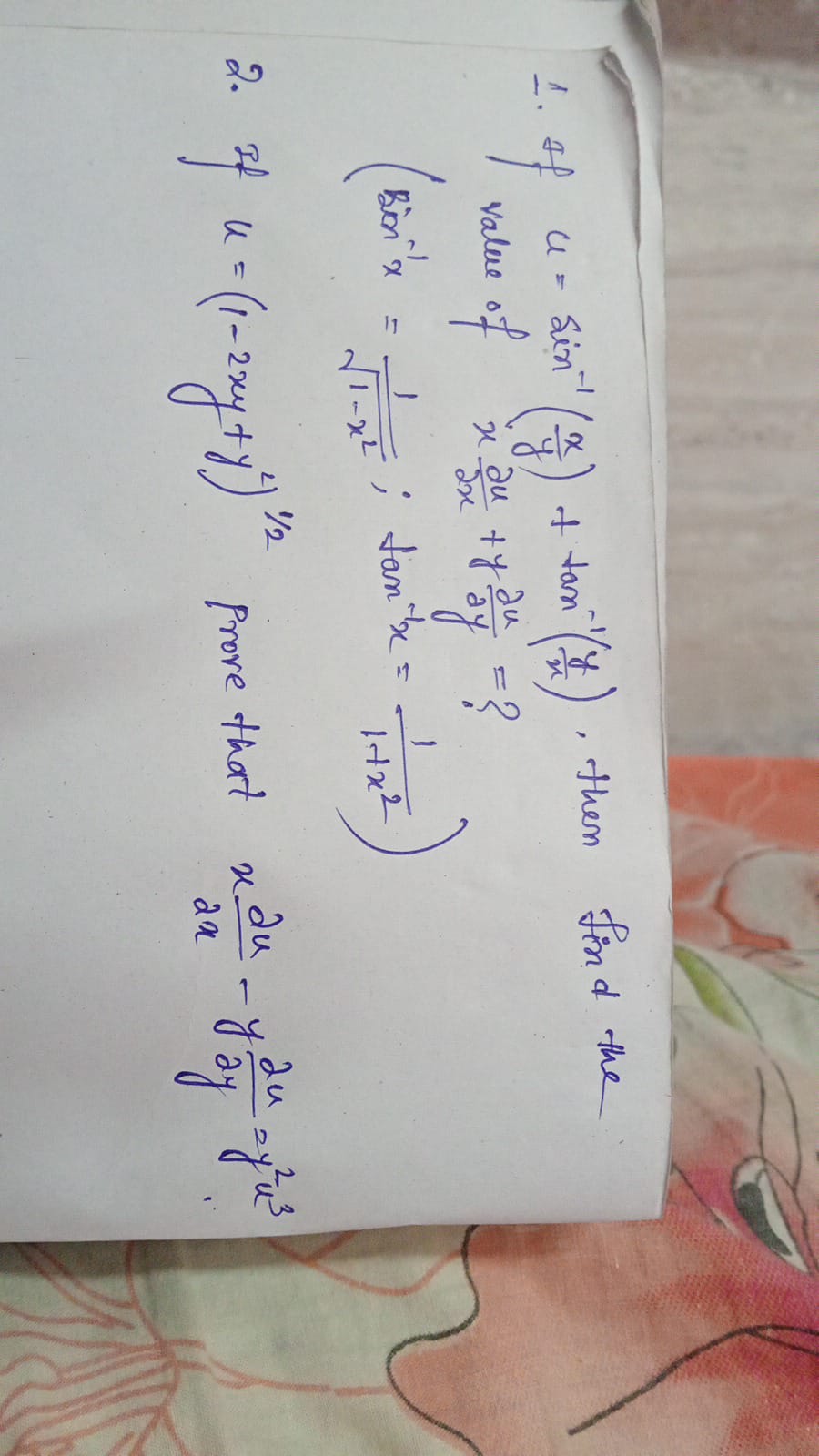If u = sin^-1(x) + tan^-1(y), find the value of x * (du/dx) + y * (du/dy) = ? Prove that (x * du/dx) - (y * du/dy) = ...

Understand the Problem
The question appears to involve finding derivatives of a function using implicit differentiation and proving a relationship involving partial derivatives. It asks for the derivatives of a specific function related to inverse trigonometric functions.
Answer
1. \( x \frac{du}{dx} + y \frac{du}{dy} = \frac{x}{\sqrt{1 - x^2}} + \frac{y}{1 + y^2} \) 2. \( x \frac{du}{dx} - y \frac{du}{dy} = \frac{x}{\sqrt{1 - x^2}} - \frac{y}{1 + y^2} \)
Answer for screen readers
The values calculated are:
-
( x \frac{du}{dx} + y \frac{du}{dy} = \frac{x}{\sqrt{1 - x^2}} + \frac{y}{1 + y^2} )
-
( x \frac{du}{dx} - y \frac{du}{dy} = \frac{x}{\sqrt{1 - x^2}} - \frac{y}{1 + y^2} )
Steps to Solve
- Find the Derivatives of ( u )
Given ( u = \sin^{-1}(x) + \tan^{-1}(y) ), we need to find ( \frac{du}{dx} ) and ( \frac{du}{dy} ).
Using the derivatives:
- The derivative of ( \sin^{-1}(x) ) is ( \frac{1}{\sqrt{1 - x^2}} ).
- The derivative of ( \tan^{-1}(y) ) is ( \frac{1}{1 + y^2} ).
So we have:
$$ \frac{du}{dx} = \frac{1}{\sqrt{1 - x^2}} + 0 = \frac{1}{\sqrt{1 - x^2}} $$
$$ \frac{du}{dy} = 0 + \frac{1}{1 + y^2} = \frac{1}{1 + y^2} $$
- Calculate ( x \frac{du}{dx} + y \frac{du}{dy} )
Now substitute the derivatives into the expression ( x \frac{du}{dx} + y \frac{du}{dy} ):
[ x \frac{du}{dx} + y \frac{du}{dy} = x \left(\frac{1}{\sqrt{1 - x^2}}\right) + y \left(\frac{1}{1 + y^2}\right) = \frac{x}{\sqrt{1 - x^2}} + \frac{y}{1 + y^2} ]
- Proving ( (x \frac{du}{dx}) - (y \frac{du}{dy}) )
Now we find ( x \frac{du}{dx} - y \frac{du}{dy} ):
[ x \frac{du}{dx} - y \frac{du}{dy} = \frac{x}{\sqrt{1 - x^2}} - \frac{y}{1 + y^2} ]
This is the form we need to prove to find its value.
The values calculated are:
-
( x \frac{du}{dx} + y \frac{du}{dy} = \frac{x}{\sqrt{1 - x^2}} + \frac{y}{1 + y^2} )
-
( x \frac{du}{dx} - y \frac{du}{dy} = \frac{x}{\sqrt{1 - x^2}} - \frac{y}{1 + y^2} )
More Information
The derivatives of the inverse trigonometric functions play a crucial role in differentiating composite functions. This problem combines knowledge of implicit differentiation with applications of derivatives in real-world situations.
Tips
- Forgetting to include constant derivatives when taking derivatives for mixed variables.
- Incorrectly applying the chain rule, especially for inverse trigonometric functions.
AI-generated content may contain errors. Please verify critical information